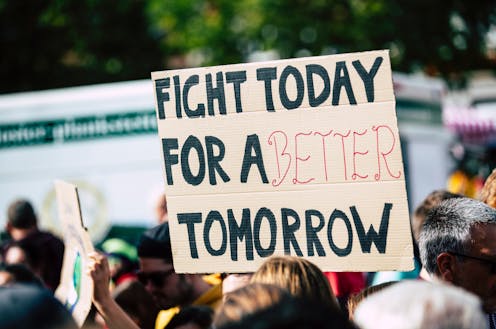What do we owe future generations? And what can we do to make their world a better place?
- Written by Michael Noetel, Senior Lecturer in Psychology, Australian Catholic University

Your great grandchildren are powerless[1] in today’s society. As Oxford philosopher William MacAskill says:
They cannot vote or lobby or run for public office, so politicians have scant incentive to think about them. They can’t bargain or trade with us, so they have little representation in the market, And they can’t make their views heard directly: they can’t tweet, or write articles in newspapers, or march in the streets. They are utterly disenfranchised.
But the things we do now influence them: for better or worse. We make laws that govern them, build infrastructure for them and take out loans for them to pay back. So what happens when we consider future generations while we make decisions today?
Review: What We Owe the Future – William MacAskill (OneWorld)
This is the key question in What We Owe the Future[2]. It argues for what MacAskill calls longtermism: “the idea that positively influencing the longterm future is a key moral priority of our time.” He describes it as an extension of civil rights and women’s suffrage; as humanity marches on, we strive to consider a wider circle of people when making decisions about how to structure our societies.
MacAskill makes a compelling case that we should consider how to ensure a good future not only for our children’s children, but also the children of their children. In short, MacAskill argues that “future people count, there could be a lot of them, and we can make their lives go better.”
Read more: Friday essay: 'I feel my heart breaking today' – a climate scientist's path through grief towards hope[3]
Future people count
It’s hard to feel for future people. We are bad enough at feeling for our future selves. As The Simpsons[4] puts it: “That’s a problem for future Homer. Man, I don’t envy that guy.”
We all know we should protect our health for our own future. In a similar vein, MacAskill argues that we all “know” future people count.
Concern for future generations is common sense across diverse intellectual traditions […] When we dispose of radioactive waste, we don’t say, “Who cares if this poisons people centuries from now?”
Similarly, few of us who care about climate change or pollution do so solely for the sake of people alive today. We build museums and parks and bridges that we hope will last for generations; we invest in schools and longterm scientific projects; we preserve paintings, traditions, languages; we protect beautiful places.
There could be a lot of future people
Future people count, and MacAskill counts those people. The sheer number of future people might make their wellbeing a key moral priority. According to MacAskill and others, humanity’s future could be vast[5]: much, much more than the 8 billion alive today.
While it’s hard to feel the gravitas, our actions may affect a dizzying number of people. Even if we last just 1 million years, as long as the average mammal – and even if the global population fell to 1 billion people – then there would be 9.1 trillion people in the future.
The future of humanity could be unimaginably large, so those people deserve some moral weight.We might struggle to care, because these numbers can be hard to feel. Our emotions don’t track well against large numbers. If I said a nuclear war would kill 500 million people, you might see that as a “huge problem”. If I instead said that the number is actually closer to 5 billion[6], it still feels like a “huge problem”. It does not emotionally feel 10 times worse. If we risk the trillions of people who could live in the future, that could be 1,000 times worse – but it doesn’t feel 1,000 times worse.
MacAskill does not argue we should give those people 1,000 times more concern than people alive today. Likewise, MacAskill does not say we should morally weight a person living a million years from now exactly the same as someone alive 10 or 100 years from now. Those distinctions won’t change what we can feasibly achieve now, given how hard change can be.
Instead, he shows if we care about future people at all, even those 100 years hence, we should simply be doing more. Fortunately, there are concrete things humanity can do.
Read more: Labor's climate change bill is set to become law – but 3 important measures are missing[7]
We can make the lives of future people better
Another reason we struggle to be motivated[8] by big problems is that they feel insurmountable. This is a particular concern with future generations. Does anything I do make a difference, or is it a drop in the bucket? How do we know what to do when the long-run effects are so uncertain[9]?

















